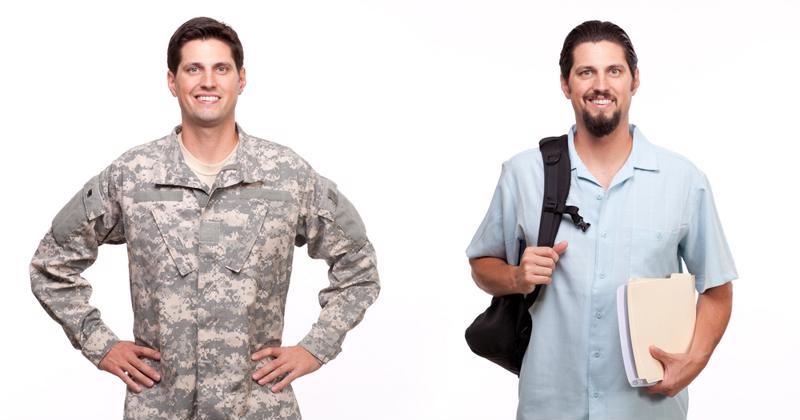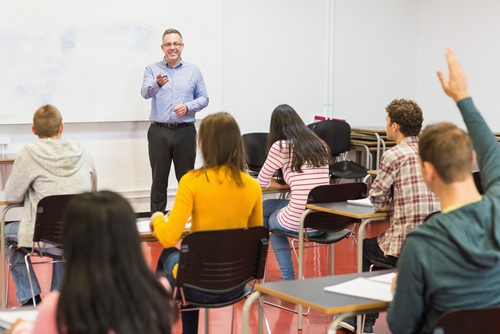In recent years, large numbers of veterans have returned home and enrolled in college to broaden their civilian skill sets and hopefully begin a fulfilling career during their life after service. As of today, more than a million former service members have taken advantage of their educational benefits, according to statistics from the Department of Veterans Affairs. This number is expected to increase by 20 percent in the years to come. Despite these encouraging enrollment numbers, many veterans have struggled with the transition from the battlefield to the lecture hall, Military Times reported.
“To come on campus in your mid-20s after having served, having nothing in common with your peers, it tends to generate feelings of separation,” retired Army Lt. Col. John Bechtol told the publication. “There’s often just this sense of loneliness, a feeling of being disconnected from their classmates.”
Institutions across the country are well aware of this problem but most find it difficult to pinpoint a solution. Luckily, these schools now have a workable blueprint off of which they can base on-campus veteran service programs.
 Colleges are helping veterans transition from the battlefield to the lecture hall.
Colleges are helping veterans transition from the battlefield to the lecture hall.New England school steps up
Northeastern University in Boston is home to approximately 600 student veterans, according to the college’s Center for the Advancement of Veterans and Service Members (CAVS). Why do so many discharged military personnel flock to the university? Northeastern has cultivated an effective financial and social support system, WBUR reported. The process started back in 2012 when school administrators invested $2 million in the VA’s Yellow Ribbon Program, a federal educational initiative that lowers tuition costs and fees for veterans enrolled in degree-granting institutions. In the years since, Northeastern has participated in the program and contributes an estimated $25,000 in financial aid to its 150 undergraduate veterans.
Marine Corps veteran Max Spahn was able to graduate last year free of debt, which he attributes to the school’s robust financial incentives.
“Zero costs to me out of pocket is the biggest thing,” he explained. “And I’m still going to be able to graduate without a dime coming out of my pocket, because of Northeastern.”
In addition to its aid packages, the college offers a comforting social atmosphere for former service personnel. For starters, CAVS, established in 2015, helps veterans navigate campus and connect with staff and students who have also served in the armed forces. Andy McCarty, director for the organization, takes a hands-on approach, guiding war-weary young men and women as they move on from their military days.
“They think that because the military gave them a job, a very specific job, their military occupation skill, that that’s somehow a vocation, and the job that they have to hold for the rest of their lives,” McCarty, an Air Force veteran, told WBUR.
Other on-campus organizations, such as the Student Veterans Association, provide extra support. Together, these fixtures combine to form a unique educational experience for the former service members who attend Northeastern, 82 percent of whom go on to graduate.
“Northeastern offers a comforting social atmosphere for former service personnel.”
Northeastern moves forward
This month, the university once again added to its veteran services portfolio, opening an on-campus Veterans for Foreign Wars (VFW) post, the second of its kind. Spahn has signed on to command the post, which has no physical location as of yet. Still, the new VFW post will allow former service members at Northeastern to engage with the veteran community at large and provide yet another point of connection for the men and women who have served. The post will cater to younger veterans who want to get out and explore rather than stay indoors and reminisce.
“They do more of the social gatherings, and it’s not necessarily at a VFW post all the time,” Brian Martin, state commander for the Massachusetts VFW, told WBUR. “They’re looking for the camaraderie, but in different settings. They have running teams. They do the Tough Mudder races, things like that. That’s how they join together. They go out together, and they compete in things.”
Overall, Northeastern’s commitment to student veterans stands as shining example for colleges searching for ways to connect with the military population and provide an ideal academic and social environment for former service members hoping to build a life post-discharge.

